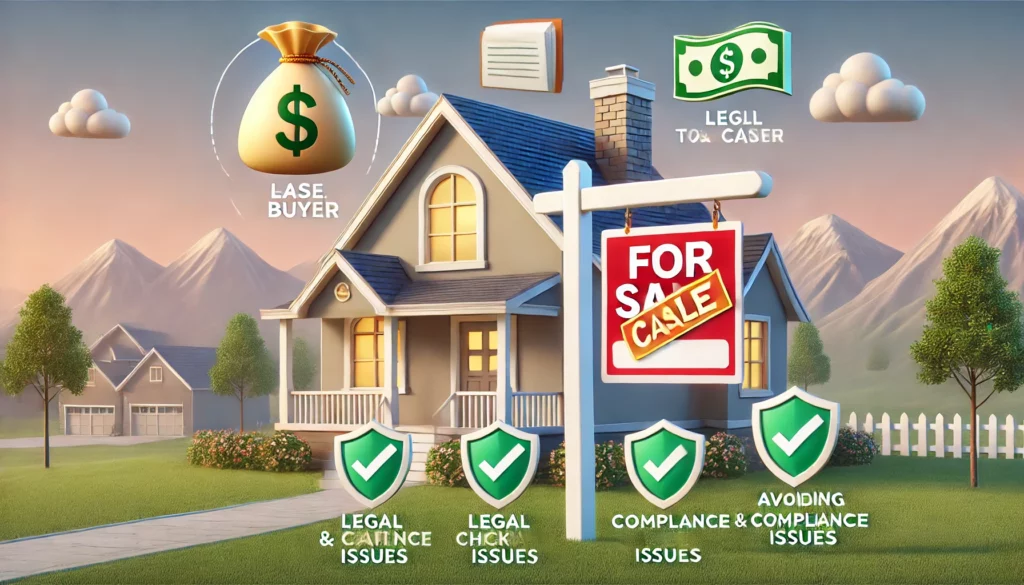Introduction
If you’re reading this, you might be feeling overwhelmed or uncertain about the process of selling a home that has unpermitted work. Whether you’re dealing with unfinished renovations, additions that weren’t approved by the local authorities, or a basement conversion that didn’t follow code, you might be wondering how this could affect your ability to sell your home. Your primary concern is likely the legality and financial implications of the unpermitted work. You want answers to questions like:
- Can I sell my house with these issues?
- Will potential buyers be turned off by unpermitted work?
- What should I expect when it comes to the selling process and possible complications?
Most importantly, you’re probably seeking clarity on whether it’s worth fixing the issues or if it’s easier and more profitable to sell the house as-is. You’re likely frustrated by the red tape and unsure of your options. The goal of this blog is to help you understand the best course of action for your unique situation and explain how selling to a cash buyer might just be the easiest and most profitable choice for you.
How to Sell a House With Unpermitted Work for Cash

When you’re looking to sell a house that has unpermitted work, the process can feel complicated. However, selling a house for cash can offer you a solution that bypasses many of the typical hurdles that would come with a traditional sale. In this blog, we’ll explore the steps you need to take, the pros and cons of selling your home with unpermitted work, and how working with a cash buyer could save you time, money, and stress.
What Is Unpermitted Work and How Does It Affect Home Sales?
Unpermitted work refers to any renovations or changes made to a property that were not approved by the local authorities through the proper permitting process. This could include things like adding a bathroom, finishing a basement, or even installing a deck, all of which may have been done without the necessary permits.
Unpermitted work can affect a home sale in multiple ways. First, it may be flagged during the buyer’s inspection process, where the inspector will note any discrepancies with local building codes or the lack of permits for certain work. This could make it difficult for buyers to get financing, as lenders typically require that all work on a home be done according to code. In the worst-case scenario, it could even lead to a buyer pulling out of the sale entirely if they can’t get the necessary financing or the work doesn’t meet safety standards.
But that’s not the only challenge you might face. If a buyer notices the unpermitted work and insists that it be fixed, you may be forced to either complete the work to code (which could be expensive and time-consuming) or offer a significant price reduction, both of which could diminish the value of your home.
In cases like this, it can be helpful to explore alternative ways of selling the property, such as through a cash sale. Working with a cash buyer means you can skip over the headaches of dealing with inspections, appraisals, and other typical sale processes. What Is Unpermitted Work and How Does It Affect Home Sales? is a relevant question to explore, and as you continue reading, you’ll learn how to handle these issues effectively by working with cash buyers.
The Challenges of Selling a House With Unpermitted Work in Traditional Markets

Selling a house in the traditional real estate market with unpermitted work can be tricky. The issue of permits often comes up during the inspection and appraisal processes. Banks and lenders are stringent about ensuring a property is up to code before approving a mortgage. Therefore, a buyer seeking a loan might find themselves unable to proceed with the purchase if they discover unpermitted work. This is especially true in areas with strict zoning laws or where homes are subject to frequent inspections.
In addition, traditional buyers may be hesitant to deal with properties that have these issues because they worry about the hidden costs involved in bringing the property up to code. It’s not uncommon for sellers to have to negotiate the price down significantly to compensate for the unpermitted work. This can lead to a frustrating back-and-forth and potentially result in the sale falling through.
On the other hand, cash buyers are often willing to purchase properties with unpermitted work because they have the flexibility to bypass inspections, deal with repairs themselves, and close the sale much faster. If you’re dealing with a property that has unpermitted work, it’s worth considering whether a cash sale could offer a faster, more straightforward solution. The time and stress saved may be worth more than negotiating with traditional buyers.
Can You Sell a House With Unpermitted Work in Maryland? If you’re located in Maryland, this is a question you’ll want to explore to see how the laws in your state could affect the sale process.
Why Selling a House With Unpermitted Work for Cash Is a Great Option
Selling a house for cash is a smart choice for homeowners who are dealing with unpermitted work. When you sell for cash, you don’t need to worry about inspections, appraisals, or potential issues that could arise from the unpermitted work. Cash buyers often buy houses in “as-is” condition, meaning they are willing to purchase your home without requiring you to complete repairs, even if the work was done without proper permits.
Cash buyers can often offer a faster closing time compared to traditional buyers, meaning you won’t have to wait months to close the deal. This can be particularly advantageous if you’re facing time constraints or simply want to move on from the property. The transaction process is usually much more straightforward, allowing you to skip all the complexities associated with permits, contractors, and compliance issues.
Additionally, selling your house for cash can help you avoid costly repairs and renovations. Even if you were able to complete the work to code, the costs of permits, inspections, and repairs could quickly add up. In some cases, it’s more cost-effective to sell the house as-is and let the buyer handle any necessary work. Fixing vs. Selling a House With Unpermitted Work in Virginia is a question you should explore to see if selling the house for cash would be a better financial option.
The Potential Pitfalls of Selling a House With Unpermitted Work for Cash

Although selling a house for cash has its advantages, it’s important to keep in mind that there can still be some pitfalls. For one, cash buyers may offer less money for your property compared to traditional buyers who can secure financing. However, it’s important to weigh the pros and cons.
- Lower Offers: Cash buyers often factor the unpermitted work into their offers, potentially resulting in a lower price than what you might get from a buyer with financing. However, this lower offer is often made up for by the speed and ease of the sale, which saves you time and money.
- Limited Buyer Pool: While there are many investors who purchase homes for cash, not all buyers are equipped to handle the complexities of unpermitted work. You may find that the number of cash buyers willing to buy your property is smaller than the traditional market, which could delay the sale.
- Possible Legal Issues: In some areas, failing to disclose unpermitted work to a buyer could result in legal complications. If you’re planning to sell for cash, make sure you’re transparent with the buyer about the issues to avoid any future disputes.
How to Sell a House With Code Violations in Pennsylvania explores another area where you may run into challenges when selling with unpermitted work. Each state has its own laws, so it’s important to understand the specific regulations in your area.
Should You Fix the Unpermitted Work or Sell As-Is?
One of the most common questions homeowners face when dealing with unpermitted work is whether they should fix the issues before selling or sell the property as-is. The decision depends on several factors, including the extent of the work that was done, the cost of obtaining the proper permits, and the market value of the home.
For instance, if the unpermitted work is relatively minor and inexpensive to fix, you might choose to repair it to increase the home’s value. However, if the work is extensive and costly, it may be more beneficial to sell the property as-is to avoid spending money on repairs that may not give you a return on investment.
For many sellers, the most practical solution is to sell the home to a cash buyer. With a cash sale, you can avoid making repairs altogether, saving both time and money. Benefits of Selling a House With Unpermitted Work for Cash in Virginia can provide further insights into why selling to a cash buyer might be the best option in your situation.
How Unpermitted Work Affects Your Home’s Market Value

Unpermitted work can have a significant impact on your home’s market value. While some buyers may overlook minor unpermitted work, larger projects like additions, second stories, or substantial renovations can raise red flags. Buyers often worry about whether the work was done safely and whether they will be required to make costly changes to bring the house up to code.
This uncertainty leads to a lower offer price for the property, as buyers tend to discount homes that have unpermitted work. The cost to remedy unpermitted work can be substantial, depending on the scope of the changes. For example, a bathroom addition might not just require a permit but could also require electrical and plumbing work that meets local codes. Fixing these problems could cost thousands of dollars, which buyers factor into their offers.
However, if you choose to sell to a cash buyer, you may avoid these issues entirely. Cash buyers understand the risks associated with unpermitted work and are often willing to take the property as-is. This means you won’t need to spend time or money bringing the home up to market standards. This can also help you avoid the frustration of negotiating down your asking price with traditional buyers who may be put off by the unpermitted work.
If you’re wondering how unpermitted work could affect the value in your state, it’s worth researching local laws and regulations to understand how much impact it could have on the sale price.
Navigating Local Building Codes and Permitting Requirements
One key issue that arises when selling a house with unpermitted work is the complexity of local building codes and permitting requirements. These codes vary from city to city and state to state, and understanding them can be a daunting task. Typically, local building codes are in place to ensure that construction and home improvements are done safely and up to standard. When work is done without the proper permits, it may not comply with these codes, which can affect everything from structural integrity to the safety of the home’s electrical or plumbing systems.
In some cases, local authorities may require that you bring the home up to code, even if it means undoing the unpermitted work. This can be costly and time-consuming, as you may have to hire licensed contractors to make the necessary repairs or alterations. Moreover, unpermitted work that doesn’t comply with building codes could potentially lead to fines or legal liabilities.
However, by selling your home to a cash buyer, you may be able to bypass many of these requirements. Cash buyers often purchase properties without worrying about local codes and permits, especially if they plan to fix the issues themselves. How to Sell a House With Code Violations in Watertown NY might give you more insights on how different areas handle unpermitted work and what specific actions you should consider when dealing with it.
How Selling to a Cash Buyer Can Help You Avoid Legal and Compliance Issues

Another concern for homeowners with unpermitted work is the potential for legal and compliance issues. In some cases, if the work was not done to code or if it wasn’t disclosed during the sale, you could be liable for any future issues the buyer may encounter. This is especially true in cases where significant structural changes were made, such as room additions or alterations to the foundation, electrical, or plumbing systems.
In these situations, buyers may request that you either fix the issues or reduce the sale price to reflect the cost of repairs. If you fail to address the issues properly, you may face legal ramifications after the sale. Furthermore, if the buyer is unable to obtain financing due to the unpermitted work, you may have to relist the home, causing delays and additional costs.
By selling to a cash buyer, you can avoid these potential headaches. Cash buyers are typically experienced in dealing with homes that have code violations or unpermitted work, and they often have the resources to manage the legal and compliance issues themselves. This not only alleviates stress but also prevents you from having to worry about potential lawsuits or fines down the road. Selling as-is ensures that you’re not taking on any more risk than necessary. Learn more about disclosures in real estate transactions and how they apply when selling a home with unpermitted work.
Exploring the Costs of Permitting and Repairing Unpermitted Work
If you’re considering fixing the unpermitted work before selling your home, it’s important to understand the costs involved in obtaining permits and bringing the property up to code. The cost of repairs can vary greatly depending on the scope of the unpermitted work. For instance, if you’ve finished a basement without permits, you may need to address plumbing, electrical, and HVAC systems to meet building code requirements.
Permitting fees vary by location and can be substantial, particularly if multiple inspections are required. On top of that, contractors may charge higher rates for work that must be done to meet code, which could increase your costs further. If significant structural changes are required, such as reinforcing a foundation or fixing an addition, these expenses can quickly add up to tens of thousands of dollars.
Instead of incurring these costs, selling the house as-is to a cash buyer could save you a considerable amount of money. Cash buyers generally purchase homes in their current condition, including those with unpermitted work, so you won’t have to worry about paying for expensive repairs and permits. By selling for cash, you avoid the risk of over-investing in repairs that may not increase the value of your home enough to justify the costs.
How Cash Buyers Assess Properties With Unpermitted Work

Cash buyers assess properties with unpermitted work differently from traditional buyers. While most traditional buyers are concerned about the legality and potential future costs associated with unpermitted work, cash buyers are often more focused on the property’s overall potential. They typically understand the value of a property with unpermitted work and are willing to factor the cost of repairs or compliance into their offer.
One advantage of selling to a cash buyer is that they have the flexibility to deal with the unpermitted work on their own terms. Cash buyers are often investors or companies that specialize in buying homes with issues like unpermitted work, and they have the resources to handle the necessary repairs without involving the homeowner. In fact, cash buyers are often more concerned about the overall value of the property and the location rather than whether the work was done with permits.
When evaluating a home, a cash buyer will typically consider the cost of making the home livable or marketable again, factoring in any work that needs to be done. However, their offers tend to be lower than market value since they are willing to assume the cost of repairs and other issues. Benefits of Selling a House With Unpermitted Work for Cash in Syracuse NY might shed light on why cash buyers are more open to purchasing homes in this condition.
Conclusion: Why Selling Your House With Unpermitted Work for Cash May Be Your Best Bet
In conclusion, selling a house with unpermitted work is possible, but it comes with its own set of challenges. From buyer hesitations to inspection hurdles, the traditional sale process can be daunting. For sellers who want to avoid repairs, appraisals, and lengthy negotiations, working with a cash buyer like Sold First can offer an easier, quicker path to selling.
At Sold First, we specialize in buying homes in any condition, including properties with unpermitted work. We understand the complexities that come with these types of homes, and we’re here to make the process as smooth as possible. While you might receive a lower offer than you would from a buyer with financing, the convenience, speed, and certainty of the sale can outweigh the drawbacks.
By selling to Sold First, you can avoid the stress of repairs, appraisals, and potential delays. We make fast cash offers and can close in as little as a few days. If you’re looking to sell your home fast and avoid dealing with unpermitted work, Sold First could be the solution you need. Reach out today to explore your options and get a fair cash offer for your property.

